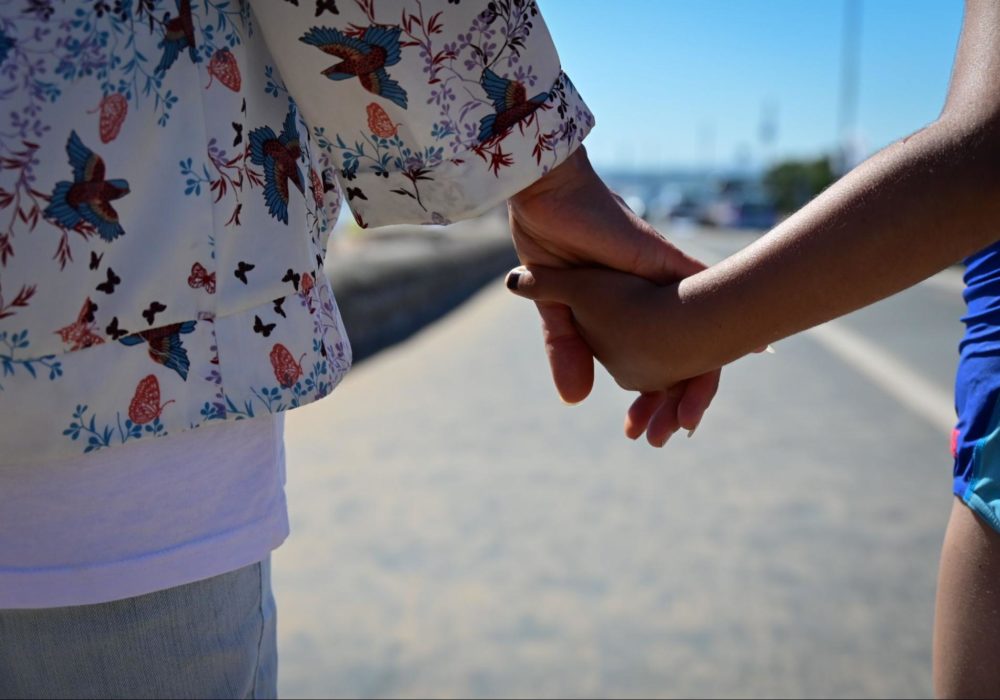
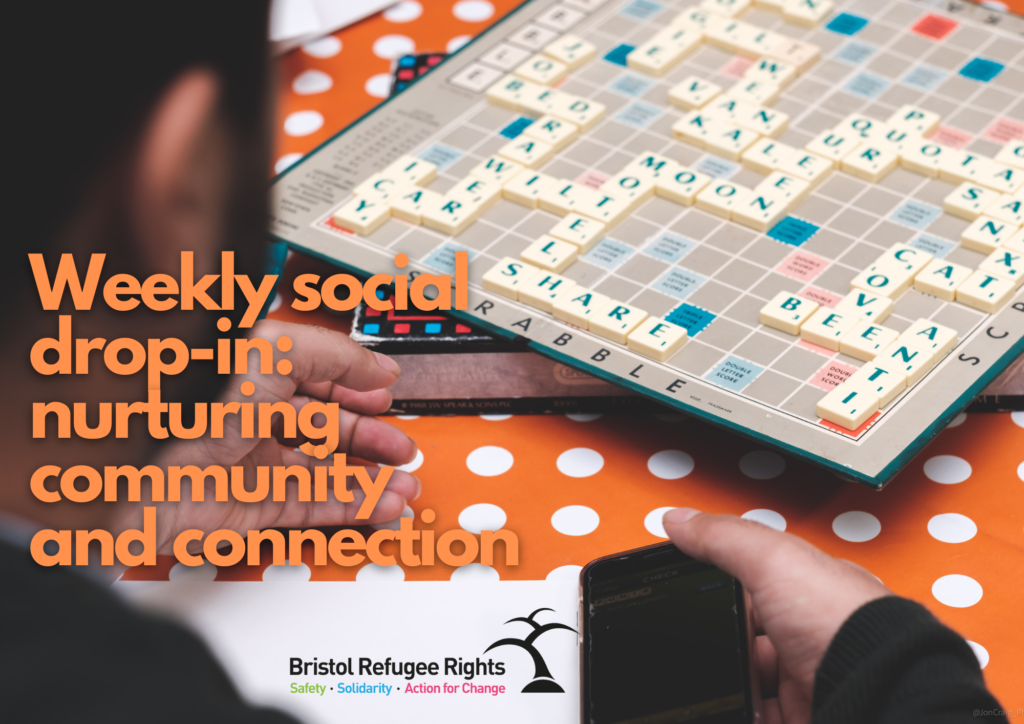
By Alice Cutler
Wellbeing; is defined as the state of being comfortable, healthy, or happy.
People seeking asylum and refugees are more likely to experience poor mental health than the UK population, including high rates of depression, PTSD and other anxiety disorders (Refugee Council 2022; Morgan et. al., 2017). While mental health problems that refugees and asylum seekers face are linked to pre-migration experiences (such as war trauma), they are also linked to post-migration conditions (such as separation from family, difficulties with asylum procedures and poor housing). Distress among displaced people is very common, and is not in itself a mental illness though can persist without timely and appropriate support networks. Common mental illnesses in displaced adults include PTSD (31%), depression (31%), anxiety disorders (11%), and psychosis (1.5%). There are also high rates of distress, grief and PTSD in displaced people under the age of 18, especially in the context of war and trauma (Academy of Medical Royal Colleges 2020).
Yet, people seeking asylum and refugees experience a number of unique barriers to accessing treatment – both systemic and individual. In 2014 BRR launched a project to be able to focus on wellbeing. We explored tools that would help us to evaluate the impact that we were having and wrestled with how different cultures and languages talk about mental health and wellbeing. We began to use the 5 ways to wellbeing to describe our services;
Connect, Take Notice, Be active, Keep Learning, Give
Over the past two years there has been an increase in people talking about wellbeing. We have all been through a global pandemic, there is increasing understanding of the need for preventative work and self care to prevent mental illness. As an organisation we have strong roots in psychologically informed ways of working, we were set up by retired professionals including social workers and mental health practitioners. However, in 2022, with stress levels in the general population higher than ever and high staff turnover it has felt like time to focus more concretely on becoming more trauma informed in everything that we do.
Walking into the BRR office there is a large sign with an arrow pointing past a vibrant flower bed filled with lavender, vegetables and trees. A small group of volunteers are having a coffee together before their shift and admiring the pergola that stretches across the beds.
A member arrives who has not been here before and rings the bell, our receptionist greets them with the warmest of smiles. As someone with lived experience of the system and a long standing volunteer she knows the importance of a good welcome.
She escorts them up to the main hall. He is met by a multilingual staff member, a highly skilled interpreter who was a volunteer and now has finally got their status. He explains what will happen next. It is the last week of the Afghan group, a service delivered by Trauma Foundation South West, their first group therapy, set up in response to long waiting lists and the desperate situation for many people from Afghanistan. BRR provided the room and paid for an interpreter. “We didn’t know if it would work, at first people could only talk about their own struggles but a real sense of group support has developed.” our staff member tells me.

After being offered tea and a seat to wait to do an assessment, our staff member shows them around: “There is a barber, an important contribution to feeling OK can be a haircut!
Or you could join in the scrabble!” After the new member interview the first priority is to fill in a Haven referral form which asks for any immediate health needs. The new member reports sleep problems, nightmares and pain in his leg from an injury.
Our volunteer yoga teacher, drops off the mats from the stretch and relax group. Another has arrived to help with distribution of smartphones, whatever else we can do to support wellbeing it is often access to Whatsapp and connections with loved ones that makes the biggest difference.
Back at the office, recently covered in plants due to a donation; someone is photocopying for her basic literacy class. It’s only a few people and lasts just 40 minutes but it’s about as long as some can manage. “We aim to build confidence for people to feel OK in a classroom, this is like phonics for adults.”
The advice workers are preparing for a monthly, mental health pathways meeting to help understand where people are at and if consent has been given to coordinate work.
“He has said that he will try to take his own life if he goes back there but there is literally no other choice for him”.
It is so hard to distinguish between the high level of distress many of our members experience and an active safeguarding risk.
We have to be careful about setting expectations and to protect our staff from being overwhelmed. At the end of the day we aim to treat each person as a human with needs that although we can not always meet, we acknowledge them and work within our capacity to do what we can.

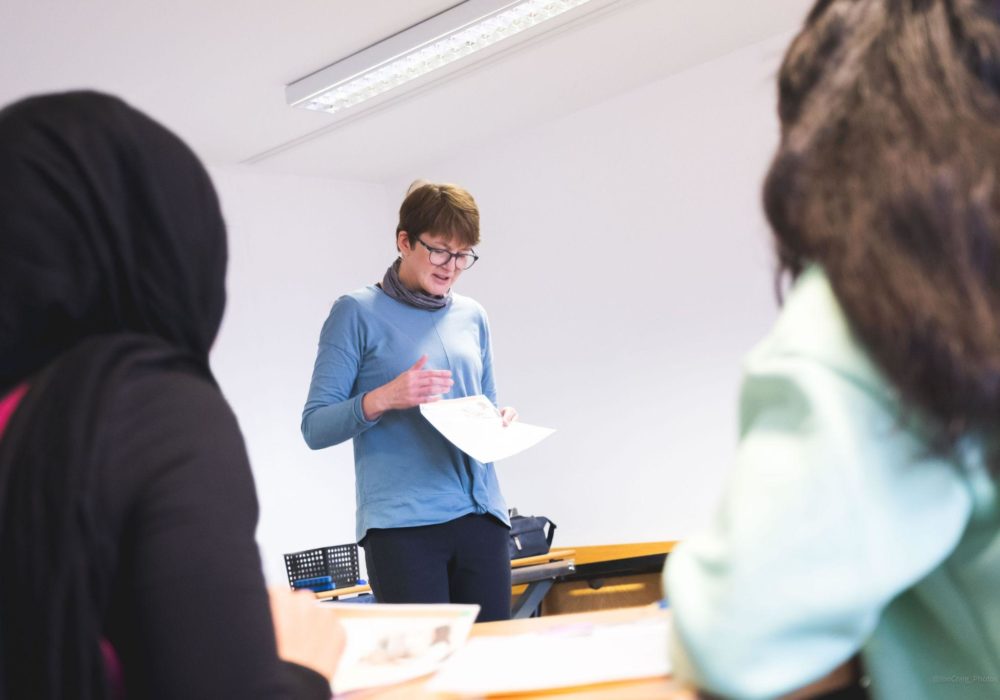
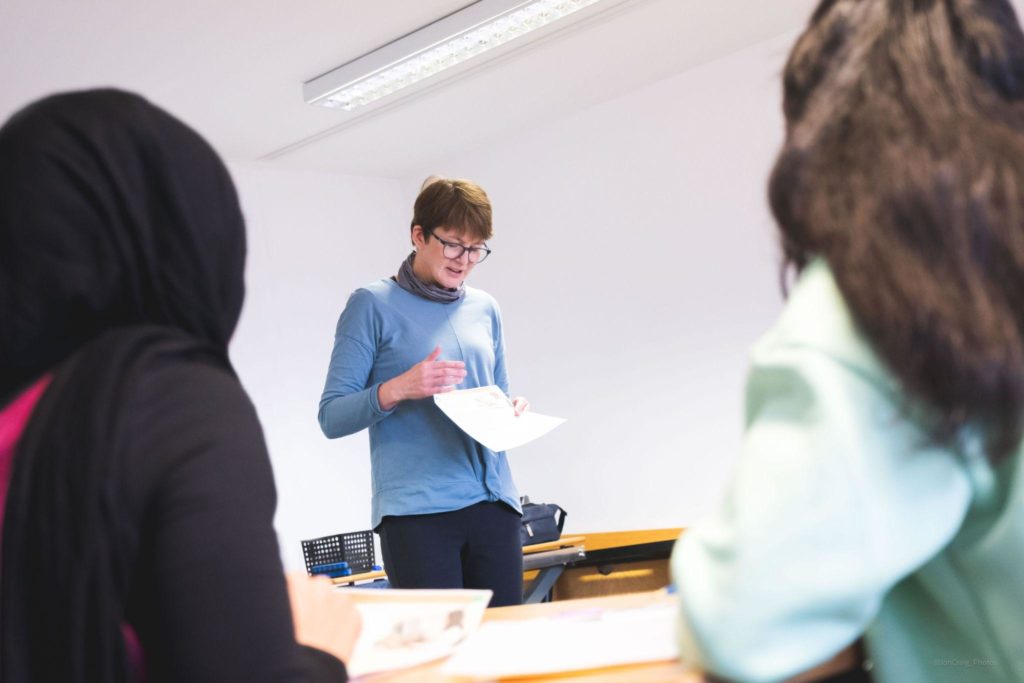
BRR currently offers a range of English classes (Pre-entry Level to Level 2 and Entry Level 1 to Level 2) and helps to get places on ESOL courses run by other organisations. BRR also offers a weekly English conversation club in which members can practise having conversations in English. A total of twenty volunteers are involved in ESOL and Education offers with classes lasting between 5-8 weeks.
Thursdays at BRR
It’s a busy Thursday at BRR, the social drop-in is taking place at Wellspring Settlement. At one end of the room, one volunteer is playing scrabble against a member which is attracting a large group of people keen to learn some new words and chat with other members and volunteers. In the kitchen, two volunteers are making lunch for everyone while at another corner of the room a computer station has been set up. Andrew, the Welcome Team manager, is busy having one-on-one conversations with various members. Before the pandemic, the drop-in was a catch-all day where members could come to get high-level advice or socialise, whereas now members can go to the advice drop-in on Wednesdays and to the socialising drop-in on Thursdays. This freed up capacity and streamlined services meaning BRR’s teams are able to help members more successfully.
Every Thursday during the drop-in, long-standing volunteer Sue runs education assessments and registrations, in order to help decide which class is most appropriate for each new learner. After taking the member’s details, Sue begins the assessment by asking them to describe what they can name in a picture to see how much they already know and where they might struggle. At the end of the assessment, Sue asks the member what their aims are and if they would want to go to college later. As Steve, our Learning and Group Coordinator, tells me “That is the ultimate goal. We catch people when they are absolute beginners and fill a gap for people who struggle to access ESOL classes at the college. The aim is to be a pipeline for people to college, to support them and prepare them to access college long term”.
After the assessment, Sue decides on the group that matches the member’s level of English and availability, and checks if they need childcare to enable their attendance. Lack of childcare has been shown to be the key barrier to learning English as a foreign language and receiving statutory or institutional support, particularly for women, putting them at a disadvantage (Liebig 2019; Schiestl et. al. 2021). Therefore, BRR’s creche provides an opportunity for parents to receive support while their children are taken care of.
However, child care is only one of many barriers that asylum seekers may face when trying to access education and professional opportunities. One member who has attended the classes, tells me how he prefers ESOL classes at BRR because he is amongst other refugees and feels more understood. Sue tells me about how the people she meets here need understanding and flexibility because people seeking asylum often spend years in limbo waiting, unable to work and not having freedom of movement. Once someone is recognised, they often still face barriers in getting their degrees and professional qualifications recognised: “Imagine training for years for your job only to be told that you have to start from the beginning again. During the asylum process, people can’t get paid employment and when they do receive status, they often have to start from scratch again as their experience, all their education and hard work is often not recognised”. While volunteering cannot provide members with the financial independence that paid employment would give them, the numerous volunteer opportunities at BRR provides members an opportunity to gain experience that gives them a platform from which to access further education and employment opportunities.
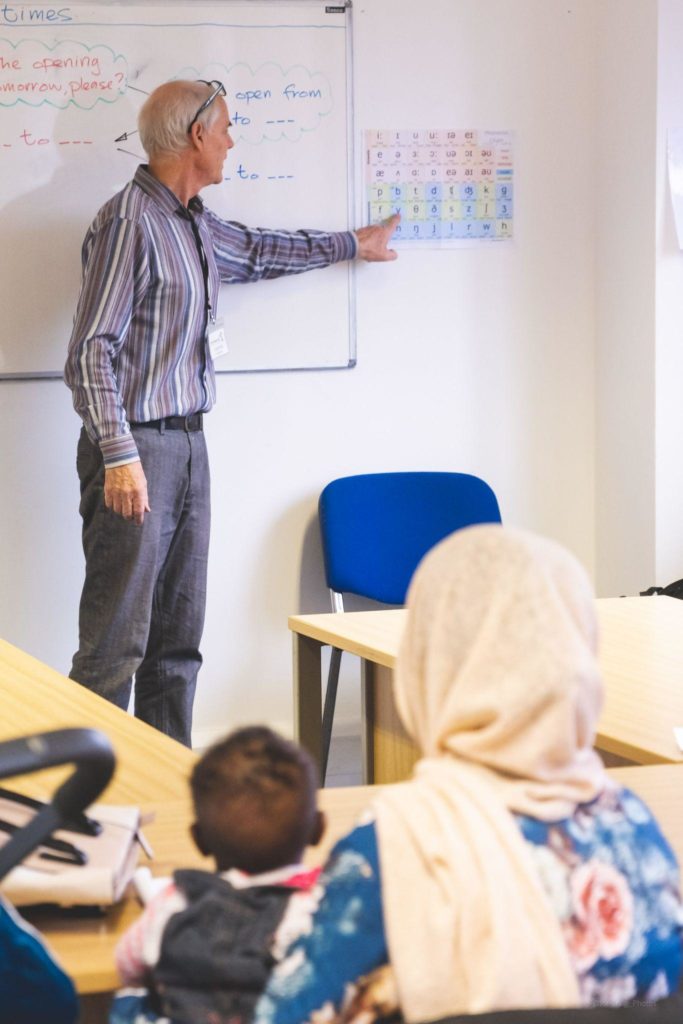
Wednesdays at BRR
When visiting the Entry Level 1 classes on a Wednesday morning, I am greeted by Laurence, an experienced tutor who has been volunteering for 12 years as a language teacher for BRR. Laurence explains that a lot of his students struggle with speaking confidently when they first attend class. For him it’s important to create an environment where they feel comfortable to make mistakes and ask for advice. The classes help students drill down into the language, go back to basics to understand sentence construction and pronunciation, to give them the building blocks of the language and a safe space to practice. One student tells me how the class has increased her confidence: “Here I don’t need to be scared to talk, everyone is very nice”.
Another woman I talked to brought her baby along to the class as she couldn’t find childcare for this specific class. She felt relieved that the teacher understood her situation: “They understand, they don’t mind, they have patience”.
After the class, Steve tells me how important it is for BRR to run the English sessions flexibly: “We understand the difficulties our members face in their day to day lives which means they are often unable to attend regularly. With our classes they don’t have the added stress and pressure of attendance, punctuality and assignments as they would do at college. Inability to keep up with this regime and other issues such as cost and childcare can lead to our members being unable to attend in the first place or dropping out which is demoralising”.
Later that day, I joined the conversation club next door, which takes place every Wednesday afternoon. Entering the classroom, it’s noticeable right away that this group knows each other well and feel relaxed and comfortable around each other. In addition to the classes, the conversation club provides an opportunity for members to become more confident in speaking English casually and freely, in a comfortable and safe setting without fear of being judged.
I sit down next to Ayla, who tells me: “When I came here six months ago, I couldn’t speak anything, I could write and I could read but I couldn’t talk anything. Now I am confident and I can speak”. Val, a volunteer, joins our conversation and tells me that Ayla has now been facilitating and leading the conversation club, something Ayla tells me she could have never imagined doing just a couple of months ago: “I am usually a shy person and I used to feel very scared about making mistakes when I speak. But now coming here and being in charge of facilitating a discussion, I feel so confident and a bit proud”.
Today the session is led by another member, who starts the session by asking the group: “Tell us one thing you like about the culture here and one thing you don’t like?”
“I like how organised British people are”, says Saabih.
Another member, smiling, adds: “that’s true, in my country people are less organised but they are also more spontaneous which I miss sometimes”.
Those simple questions open up discussions about meaningful topics and are an opportunity for members to share their experiences about what it is like to be in a new country. Saabih tells me: “We discuss at our meetings different topics so it helps us understand the new culture and also other cultures. We all come from different cultures and are used to different socialising forms”.
Yusef, another participant from Lebanon, echoes a similar sentiment: “The best thing about coming here is to learn from others’ mistakes and also about our cultures”. He continues: “For me, language is not just talking, it’s about saying what I think, for sharing my opinions, for being able to be myself. It means everything really”.
At the end of the session, participants are asked if there is anything else they would like to share. One participant tells the group that she recently got into college with support from BRR.
by Maite Ibanez Bollerhoff, Monitoring and Evaluation Lead, Bristol Refugee Rights
August 2022
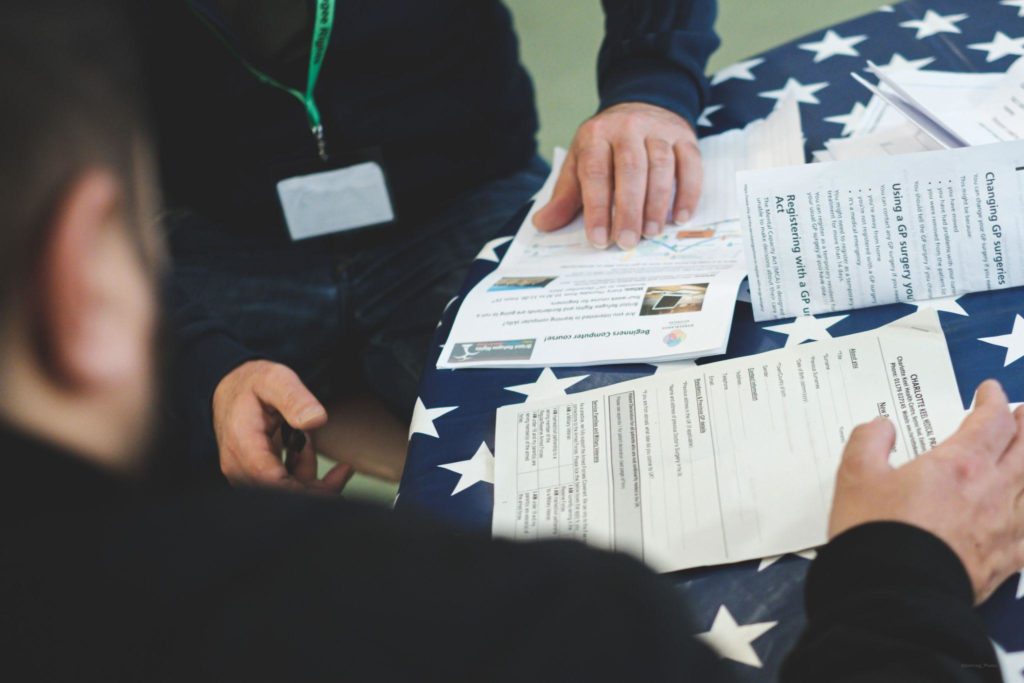


In the past three months we have experienced a sharp increase in the number of Unaccompanied Asylum Seeking Children (UASC) coming to us for help. Often they are homeless and alone or living in Home Office accommodation in a chaotic setting, being treated as adults. This pattern is the same nationally.
UASCs are young people who are seeking asylum in the UK but who have been separated from their parents or carers. In January, we met over 20 people in this situation – more than we would have expected to meet in a whole year pre-pandemic. The vast majority of these are from Afghanistan but others are also from Sudan, Iraq and Syria, and they almost all identify as male.
While a child’s asylum claim is processed, they are cared for by a local authority, but often experience inadequate support due to systemic underfunding by national government. But the biggest problem we are dealing with is children who keep saying they are children but are not being believed.
Home Office officials often assign an age, essentially a guess, that defines them as an adult. Age is notoriously hard to assess accurately and it is rare for people to arrive with documents to prove it. Birth certificates are rare in Afghanistan for example. It is very common for people who have fled not to have these papers. A child trapped in adult accommodation, sleeping in parks or living with random people is at risk and until their age is accepted, a social worker will not (and cannot) take it on.
Our Young People’s Immigration Project works with Bristol City Council to create change and improve how asylum seeking children and young people are supported through the asylum and immigration systems. Due to the sharp increase of arrivals recently, we have had to redeploy some of this funding so our workers can take on supporting age disputed young people through this key moment in their lives.
The partnership with Bristol City Council since 2018 has already delivered results, as social workers are now tending to give the benefit of the doubt and take the child’s word for it where they can. This is good practice and saves time, money and trauma. There is still a desperate need for advocacy though as young people continue to fall through the cracks.
In the last few weeks alone, 6 young people have been accepted as children and taken out of danger and into support because of our work.
Challenging an age assessment can take months. At BRR, we will always advocate for the birth date that the young person claims, and try to support them with referrals to solicitors, using interpreters, providing hardship payments, phones and top up, as well as referring them to English classes. We work closely with Welcome Wednesdays from Creative Youth Network and Refugee Council’s Children’s Adviser, to help them develop social and community connections and provide holistic advice support. We have also been collecting therapeutic sensory items for ARC Clinic at Children and Adolescent Mental Health Services (CAMHS) – a group that supports young people recovering from trauma. While such support does not achieve a quick fix, we hope that our interventions make a positive difference to these young peoples’ present and future lives.
For a personal account, please read Ali’s story here.


Bristol Refugee Rights (BRR) and the Refugee and Migration Policy Project (RAMP) have been working closely with the local council and individuals with lived experience of being subject to NRPF. The aim has been to create long term systemic change for those subject to NRPF conditions in Bristol, so as to ensure that some of the most vulnerable people don’t fall through the cracks.
From this work we have developed a Bristol Model which outlines our vision for what support is needed for those subject to NRPF in our city. The model is based on lived experiences, conversations with professionals and our expertise. It sets out what we believe all individuals subject to NRPF in our city should be entitled to. Overall the Bristol Model aims to provide people with the safety net they need to survive and thrive despite their NRPF status and to ensure that no-one in Bristol experiences destitution or homelessness. The Bristol Model is based around 4 key principles:
- Design-out Destitution. People must have access to basic goods needed to survive and thrive. This includes food, medicine, sanitary and washing facilities, the means to connect with people digitally and access to public transport.
- A Safe Place to Stay. People must have access to accommodation which is safe and secure and which provides them with privacy and dignity.
- Informed and Supported. People must have access to appropriate and specialist legal advice. People must also have access to holistic social and welfare support where needed, and support into employment where they are legally allowed to work.
- Included and Involved. People must have the opportunity to tell their story where they choose to, and to be actively involved in the design of relevant support services and advocacy activity.
A number of voluntary and statutory organisations in Bristol including officers from Bristol Council and Bristol’s mayor have signed up to this model, pledging their support for this vision of a Bristol that includes all. It is also in line with Bristol’s pledge as a City of Sanctuary to end destitution.
There is already a lot of good practise in the city which is working towards these principles: the aim of this model is to bring together good practice and close the gaps. However there is much more to be done if we want to make this model a reality for all Bristolians who are subject to NRPF. We continue to work with the Council and other organisations to create long term change to improve the lives of our members subject to NRPF.
To read our Policy Recommendations to Bristol City Council and learn more about the Bristol Model, visit our Campaigning page
To transform the lives of our members including those subject to NRPF, donate on our website.


When Yad first arrived in the UK, he applied for asylum and was housed by the asylum support system in Liverpool. He got to know some members of the Kurdish community there, but they moved on to Bristol. Yad’s initial asylum claim was refused: he was able to appeal but couldn’t find legal representation to support him in court, so attended the court session alone. He was refused again and his asylum support accommodation and subsidence were stopped.
With no support and nowhere to go, Yad remembered the community he had met who moved to Bristol and followed them here. He was homeless and sleeping in a small tent in Eastville Park. Yad’s mental and physical health were poor – he felt frustrated and upset, and struggled to access the medical care that he needed.
“I tried to contact the Home Office independently while sleeping in the park but was unable to do so without help.”
After some time he was able to find members of the community that he had met in Liverpool and they helped him a bit, sometimes letting him stay on their sofas or giving him money for food. Sometimes a local Kurdish restaurant would let Yad eat for free. The community was truly kind. But even with this limited support times were difficult – Yad was constantly moving around, never sure where he could sleep or what support would be there. He was always in other people’s spaces – relying on their kindness and hospitality.
“I was desperate for a place to live.”
“Thankfully I have managed to get past that difficult time.”
In 2020, in response to the Covid-19 pandemic, the British Government enacted a policy called ‘Everyone In’: which funded local authorities to temporarily house anyone who was homeless. This policy recognised that being homeless was a public health risk, as it was not possible for homeless people to self-isolate to protect themselves or others from the Covid-19 outbreak. The policy applied to everyone: no matter what their immigration status was. So Yad was housed by Bristol City Council in a hotel.
“It was incomparable to where I was before.”
While in the hotel Yad received £10 per week destitution support from Borderlands, a local charity. The hotel provided food for residents, although Yad struggled to eat it as it wasn’t food he was used to in his culture. He saw a 100% improvement in his health while he was in the hotel. When he was told in the winter of 2021 that the ‘Everyone In’ accommodation was going to end, Yad felt stressed and worried. While being supported in the hotel however, he had been put in touch with Bristol Hospitality Network (BHN) a local charity who provide hosted accommodation for individuals in Yad’s situation, while they work to regularise their status. As ‘Everyone In’ comes to an end, Yad has been given temporary accommodation in a BHN house and receives a £20 per week allowance from them. This means Yad will not have to face homelessness in Bristol again.
“When I heard that the Everyone In accommodation wouldn’t be extended it was stressful. I was worried. But at least for now I get £20 weekly income from BHN and I have temporary accommodation from BHN too which is great.”
Just before being housed in the hotel, Yad had been referred to Bristol Refugee Rights (BRR) by community members. BRR had helped to find a solicitor to work with him to submit a fresh asylum claim. It took Yad and his solicitor over a year to work together to gather the evidence needed to submit a fresh claim. They spent a long time waiting for the Home Office to release Yad’s previous records to the solicitor, and Covid delays also made it more difficult to gather the evidence they needed. In the winter of 2021, Yad and his solicitor finally submitted a fresh claim. This means Yad is now eligible again for accommodation and subsidence payments from asylum support. He is currently working with BRR to gather the evidence needed to apply for the support. Until it is granted, Yad knows he can stay with BHN.
These stories are from a project supporting people to tell their stories and the views expressed are their own. Due to protecting people’s voice and privacy, we have not given statutory authorities the opportunity to respond and we appreciate they may present a different perception of the individual’s situation.










